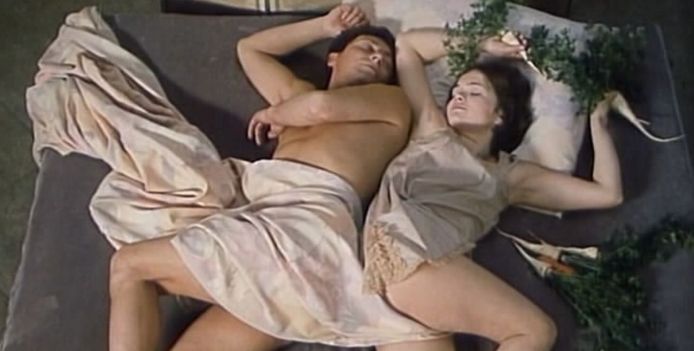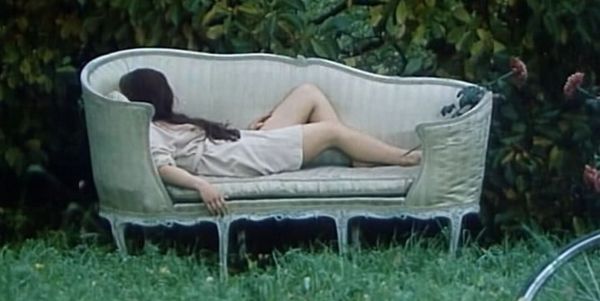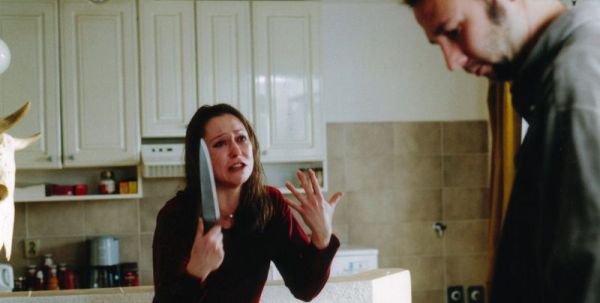Remembering Vêra Chytilová: TRAPS and FRUIT OF PARADISE

Brighton student who loves all forms of film. Happy. Ex-Godard…
When Vêra Chytilová sadly passed away in March of last year, cinephiles across the world mourned the loss of a truly passionate and original filmmaker. Chytilová was the dangerous iconoclast of the Czech New Wave. Both the BFI and Second Run DVD decided that the world must know of her work outside of her nihilistic masterpiece Sedmikrasky (Daisies, 1966), and as such the BFI ran a series showing many of her films at their Southbank cinema, and Second Run released two of her films, Pasti, Pasti, Pasticky (Traps, 1998) and Fruit of Paradise (1970), on their excellent DVD line.
Fruit of Paradise (1970)
Fruit of Paradise is Chytilová’s follow-up to Daisies, and it is a beautiful Dadaist mayhem much like its predecessor. The opening sequence of the film is one the most visually entrancing moments in film history. Adam and Eve roam around a Garden of Eden comprised of natural textures and colours; they themselves become part of the Edenic landscape as their spiritual discovery of the environment, the self and each other develops. It is a restrained, yet completely engulfing experience that is only enhanced by Zdenêk Liška’s electronic score.

We are introduced to Eva and Josef under a tree, an apple falls and Eva takes a bite. The creation story is unfolding, but this is not a retelling; Chytilová uses the biblical story as a starting point for hers. This is a film about sex, and about female and male relationships to their respective genders, and to each other. The film is heavily loaded with symbolism: in the mise-en-scene, in the characters, in the narrative. As such, many interpretations are available to the viewer; a biblical criticism, a distinctly modern sexual tale (in which the woman is free to sleep with whoever she wishes), a love story of sorts, and many others. To this viewer the film is a great many things: it is a feminist assertion of the brilliance of a woman having control and confidence over her own sexuality, it is a postmodern amalgamation of nature, religion, sex and fairy tales, it is, if nothing else, a beautiful, riotous, wonderful film that needs no concrete interpretation to be fully appreciated.
In Fruit of Paradise Chytilová continued many themes she encountered in Daisies, as well as her formal experimentation. It is in many ways the equal of Daisies, and is a film that, when more widely seen, will garner much more respect.
Traps (1998)
Traps takes place in post-communist Czech Republic. It details the story of two businessmen who kidnap and rape a dentist, who gets revenge by castrating the two men. The opening of the film presents the audience with all the tenants of bourgeois opulence in full bloom. Large feasts remind of the delirious ending of Daisies, and the white male dominates the social order. Despite Chytilová’s angry and retributive tenor, this is a darkly funny film.

We are given a classical double act in the two men who perpetrate a horrific act of sexual violence upon the female lead; the straight man and the accidental, portly, clown. Chytilová uses these two characters as a bathetic device to undercut some extremely violent and serious moments, and this works very well on occasion. However, the slapstick and physical comedy are not always for the better in Traps. Some moments in the film cry out for a straight performance in order to give some notion of an analysis of the issues presented, and these moments are regularly lost in the midst of a large man mourning his genitals.
The film does succeed in many other areas. Its rape scene is paradoxical: it summons emotions from the viewer that are seemingly contradictory. This is an accomplishment of a very high order; if film is an emotional medium then this scene represents something remarkable in the many ways it can make a person feel. The scene terrorises the mind for much of the film – its persistence in the presentation of the act is so unrelenting, yet the scene is also funny. How can this be morally acceptable? To laugh now is surely shameful, but Chytilová is reckless here, and she pursues so many emotional ambitions that this scene is one of the moments in which the viewer remembers her joyful powers in her earlier works.
Traps represents something that is rare in the film canon: an auteur who has lived under both communism and capitalism in the same country. Chytilová shows herself as a true rebel by transcending traditional rhetoric towards the two ideologies and attempting a true criticism of both. She has survived, and thrived, to be able to dissent both these hegemonies when they were dominant. Traps is a dissection of patriarchal norms within capitalism. The film challenges a world in which women’s bodies are unquestioningly seen as playgrounds for male violence. Its comedy serves as an opportunity for the male ego to be satirised. Here is Traps’ similarity with Daisies: it is a feminist critique of patriarchy in a poisonous society. Traps, despite its flaws, is a film that surely deserves more notice than it has so far been given.
Vera Chytilová may be the greatest director to spring from the Czech New Wave, a movement that included Miloš Forman, Jan Nêmec, Jirí Menzel, Dušan Hanák, Jaromil Jireš and many others. It’s time she was loved as the master that she is.
Which other under-shown and under-appreciated directors need a retrospective?
Later this year Second Run will be releasing Chytilová’s 1963 debut feature O Necem Jinem (Something Different) accompanied by the short film Pytel Blech (A Bag of Fleas).
(top image: Fruit of Paradise (1970) – source: Radim Films)
Does content like this matter to you?
Become a Member and support film journalism. Unlock access to all of Film Inquiry`s great articles. Join a community of like-minded readers who are passionate about cinema - get access to our private members Network, give back to independent filmmakers, and more.
Brighton student who loves all forms of film. Happy. Ex-Godard addict. Watches so many films. About to start degree in Film Studies. Thinks the first 10 series of The Simpsons is the greatest cultural output of any civilisation. Have a nice day.













